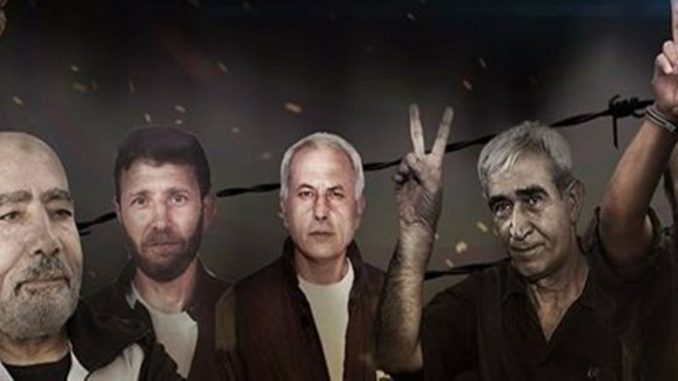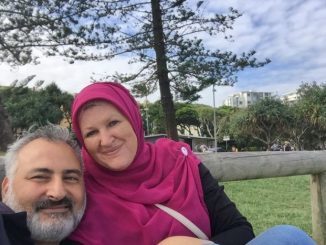
As hundreds of Palestinian prisoners entered the 38th day of a mass hunger strike in Israeli custody on Wednesday, the hunger strikers have reportedly discussed escalating tactics to pressure Israeli authorities into acceding to their demands.
The news came as dozens of prisoners, including hunger strike leader Marwan Barghouthi, were taken to hospitals on Wednesday for medical examinations
The Palestinian Prisoners’ Center for Studies (PPCS) quoted anonymous sources located inside Israeli prisons as saying that the hunger-striking prisoners were considering breaking the unity of the hunger strike should one of the hunger strikers die amid continued Israeli refusal to negotiate with the prisoners.
While the estimated 1,300 prisoners currently participating in the strike have so far stood united behind Barghouthi, a prominent Fatah leader, a “breakup” of the strike would mean that the Israel Prison Service (IPS) would have to negotiate with each prisoner individually, which PPCS head Rafaat Hamdouna said could lead to “a chaos that IPS can’t control or afford.”
While PPCS did not indicate that this was an option officially being considered by the hunger strikers, Hamdouna hypothesized that some prisoners might decide to use violence and carry out stabbing attacks against IPS guards and officials should the strike go on without official leadership.
Palestinian Committee of Prisoners’ Affairs head Issa Qaraqe told Voice of Palestine, the official radio station of the Palestinian Authority, on Wednesday that there were still no signs of Israeli authorities responding to the hunger strikers’ demands, although he expressed hope that Israel’s position might change following a meeting between Palestinian President Mahmoud Abbas and US President Donald Trump on Tuesday.
Hunger-striking prisoners are calling for an end to the denial of family visits, the right to pursue higher education, appropriate medical care and treatment, and an end to solitary confinement and administrative detention — imprisonment without charge or trial — among other demands for basic rights.
Qaraqe said that Israel had no choice but to negotiate with the leaders of the hunger strike given the dangerous point reached by a number of hunger strikers after forgoing food for more than a month, as he emphasized that the prisoners remained determined to continue with their strike until their demands were achieved, even if it meant risking their lives.
Meanwhile, Israeli news outlet Ynet reported on Wednesday that Barghouthi had been temporarily taken to a hospital on Wednesday due to his health condition, before being returned to Kishon prison.
Ynet said that 154 Palestinian prisoners were taken to hospitals to undergo medical examinations on Wednesday in total, with only 16 being hospitalized since the beginning of the week.
The media committee of the hunger strike also reported that IPS had transferred 40 hunger-striking Palestinians held in Ohalei Kedar prison to civilian hospitals on Wednesday morning.
A Palestinian Prisoner’ Society (PPS) lawyer who visited hunger striker Muhammad al-Ghoul in Ohalei Kedar reported that the conditions in which the hunger strikers were being held were increasingly unhygienic in an effort to break their will to go on with the movement.
Al-Ghoul told PPS that the prisoners had been given worn out and dirty covers, that their cells were infected with bugs, and that hunger strikers who had been transferred to Ohalei Kedar after May 16 had not been allowed to change clothes or underwear.
The media committee added in a statement that some 20 hunger-striking prisoners held in Hadarim prison in central Israel had also been transferred to a civilian hospital nearby to conduct medical checkups on Tuesday after their healths had deteriorated.
Palestinian Committee of Prisoners’ Affairs lawyer Hanan al-Khatib, who recently visited hunger-striking prisoner Yousif Kamel al-Zaaqiq, said that IPS had imposed an information blackout on the health conditions of the hunger strikers and the daily transfers of prisoners from one detention facility to another — a tactic used to exhaust, demoralize, and isolate the hunger strikers.
Al-Khatib said that Hadarim prisoners were regularly fainting, and suffered from kidney and joint pains, serious weight loss, and difficulties moving, adding that ambulances were constantly stationed at the entrance of the prison to transfer hunger strikers to hospitals.
Nonetheless, the media committee said that IPS officials in Hadarim were still conducting searches of prisoners and their belongings and confiscating salt — the only nutrient that the hunger strikers have been consuming besides water. Prisoners in Hadarim have meanwhile threatened to escalate their strike by ceasing to consume water and refusing medical checkups.
The media committee added that it had received reports of dozens of hunger strikers being taken to civilian Israeli hospitals since Tuesday.
Qaraqe has meanwhile demanded that Knesset members representing Palestinian citizens of Israel question the Israeli Ministry of Health regarding the medical readiness of field hospitals that have been set up outside of Israeli detention centers as an alternative to sending hunger-striking Palestinian prisoners to civilian hospitals.
Many fear that the field hospitals will be used to force feed the hunger strikers en masse. According to the committee in support of the hunger strike, Israeli doctors at the field clinics have reportedly offered medical care to the prisoners only in exchange for them ending their hunger strikes.
According to Qaraqe, the field hospitals lack necessary medical appliances and equipment to deal with the urgent needs of the hunger strikers, many of whom suffer from internal bleeding and heart, liver, and kidney issues.
Qaraqe said the lack of preparedness of the field hospitals showed Israel’s indifference to the fate of the hunger strikers, who risk death at any moment, and violated all medical laws and ethics.



